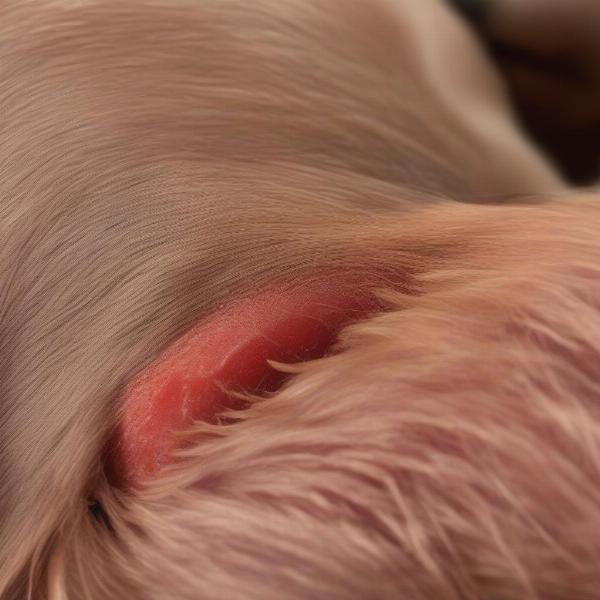Dog biting at tail base is a common behavior that can range from occasional nibbling to frantic chewing. Understanding why your dog is engaging in this behavior is crucial for addressing the underlying issue and preventing further complications. This article explores the various reasons behind tail-base biting, offering effective treatment options and preventative measures to ensure your furry friend’s comfort and well-being.
Why is My Dog Biting Their Tail Base?
There are numerous reasons why a dog might bite at their tail base. These include:
- Parasites: Fleas, ticks, and mites can irritate the skin around the tail base, leading to excessive itching and biting.
- Allergies: Environmental or food allergies can cause skin inflammation and discomfort, prompting your dog to chew at their tail.
- Hot Spots: These are moist, inflamed areas of skin that can be intensely itchy and painful.
- Impacted Anal Glands: Full or infected anal glands can cause discomfort and irritation around the tail base.
- Behavioral Issues: Anxiety, boredom, or stress can manifest as compulsive behaviors like tail chasing and biting.
- Injury: A cut, bruise, or other injury to the tail base can lead to licking and biting.
- Infection: Bacterial or fungal infections can cause itching and inflammation, prompting your dog to bite the affected area.
 Dog Biting Tail Due to Parasites
Dog Biting Tail Due to Parasites
Diagnosing the Cause of Tail Biting
If your dog is persistently biting their tail base, it’s important to consult a veterinarian. They can perform a thorough examination to identify the underlying cause. This may involve skin scrapings, allergy testing, or checking the anal glands.
Treatment Options for Tail Biting
Treatment will depend on the diagnosed cause. It may include:
- Parasite control: Regular flea and tick prevention is essential.
- Allergy management: Identifying and eliminating allergens from your dog’s environment or diet.
- Medication: Antihistamines, antibiotics, or antifungals may be prescribed to address infections or allergies.
- Behavioral modification: Training techniques, environmental enrichment, and anxiety-reducing medications can help address behavioral causes.
- Hot spot treatment: Cleaning the affected area and applying topical medications can help soothe and heal hot spots.
- Anal gland expression: If impacted anal glands are the culprit, your vet can express them to relieve the discomfort.
Preventing Tail Biting
Proactive measures can help prevent tail biting in the first place:
- Regular grooming: Brushing your dog regularly can help prevent matting and identify any skin issues early on.
- Routine parasite prevention: Use flea and tick preventatives year-round.
- A healthy diet: Providing a balanced diet can support healthy skin and coat.
- Environmental enrichment: Providing plenty of toys, exercise, and mental stimulation can help prevent boredom and anxiety.
- Regular vet checkups: Routine visits can help identify and address potential problems before they become serious.
When to Seek Veterinary Attention
If your dog’s tail biting is frequent, severe, or accompanied by other symptoms like bleeding, swelling, or hair loss, it’s essential to seek veterinary care immediately. heartworm & flea prevention for dogs
Conclusion
Dog biting at the tail base can be a sign of various underlying issues, from parasites to allergies and behavioral problems. By understanding the potential causes, you can take appropriate steps to address the problem and ensure your dog’s comfort and well-being. Don’t hesitate to consult a veterinarian if you have any concerns about your dog’s tail biting behavior. Early diagnosis and treatment are crucial for preventing further complications. mps dog suit
FAQ
- Why is my dog suddenly biting his tail? Sudden changes in behavior can be due to a variety of factors, including parasites, allergies, or injury. It’s best to consult a vet to determine the cause.
- Can stress cause a dog to bite its tail? Yes, stress and anxiety can lead to compulsive behaviors like tail biting.
- How can I stop my dog from biting its tail raw? Preventing your dog from biting their tail raw requires identifying and treating the underlying cause. A veterinarian can help diagnose and address the issue.
- Is tail biting a sign of pain? Tail biting can be a sign of pain or discomfort, especially if the tail is injured or infected.
- What home remedies can I use for dog tail biting? It’s essential to consult a veterinarian before trying any home remedies, as they may not address the underlying cause and could potentially worsen the problem. labrador dog attack
- How do I know if my dog’s anal glands are causing tail biting? Signs of impacted anal glands include scooting, licking the anal area, and a foul odor. solliquin for large dogs
- Can a dog bite its tail off? While rare, excessive and persistent tail biting can cause serious injury.
ILM Dog is a leading international dog care website dedicated to providing expert advice and resources for dog owners worldwide. We cover a wide range of topics, including dog breeds, health, training, nutrition, grooming, and product reviews. Whether you’re a new dog owner or a seasoned expert, ILM Dog is your go-to resource for all things dog-related. Contact us at [email protected] or +44 20-3965-8624. We are here to support your journey as a responsible and loving dog owner. For more expert guidance and valuable information, visit us at ILM Dog.